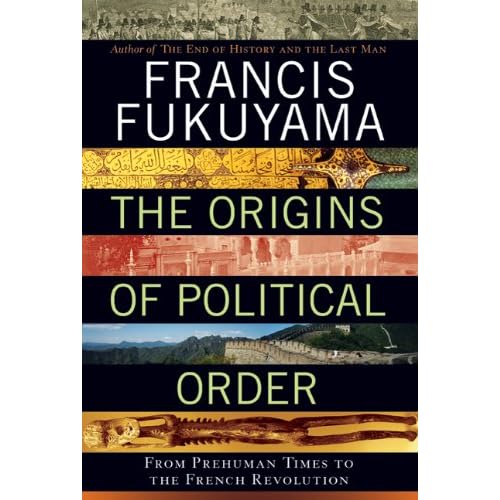Francis Fukuyama's pre 9/11 thesis was that the world was moving toward universal liberal democracy and that this constituted the final stage of the history of political structures.
Ooops.
Since then, I have paid little attention to him, although appreciating his very accurate 2007 reading that countries which embrace multiculturalism announce thereby that they have no culture of their own and will face the challenge of healthy and strong-identity cultures.
The NY Times published a pre-publication article on his upcoming 2-volume work on The Origins of Political Order.
What makes it interesting is that Fukuyama seems to take seriously something the liberal West likes to dismiss: human nature. Apparently evolutionary sociobiology is the vehicle for discussing the species-specific nature of homo sapiens. So be it. What once was the province of philosophers is now the domain of biologists. I found Steven Pinker's The Blank Slate, with its demolition of the imbalanced nurture-bias of the standard social science model of human malleability and innocence, to be very useful in this investigation. No noble savages. No blank slates.
It is a distinguishing mark of conservatives, in contrast to progressives, that a reading of human nature as it is is fundamental to any further political philosophy. As it's been said of Marxism: nice idea, wrong species. Although the American experiment seems to me in great peril, its longevity is due in large part to the Founding Fathers' combination of liberty-based optimism and historically-based pessimism about human nature. Our Constitution was made for the men that we are, not the angels we might become. Consequently, we didn't need the guilloutine. (Although we didn't escape the War Between the States). If Fukuyama takes the particular shape of the human race, our inborn species nature, into consideration in his work, it looks like it might be worth reading.


1 comment:
BTW, in defense of Fukymama's alteration of Kojève, who alter'd Hegel, perhaps one may still argue that technological civilization can be govern'd non-disastrously only liberal democracy properly supported by familio-religio-morality or enlighten'd despotism properly supported by familio-religio-morality (as in Singapore).
Islamic government in Iran still seems supported by oil money and innovation. Can Islam produce a sustainable "work ethic" as the formative ethos of a disciplined technological population?
Another experiment: western liberal democracies that have rejected familio-religio-morality. Locke, Smith, Hamilton, Jefferson, et al on up to Freud, don't say that the ethos of "capitalist" society can be the Canaanite self-fulfilment (Marcuse: "unrepression").
Some titillation by Canaanite heaven is undangerous and even improves personnel functionalness, e.g release after a hard week's work ethic by watching charismatic gangster movies as during the 1930s. But has such titillation gone too far?
Admittedly, the question may be 'moot': Islam will shut down the experiment with unrepressive "capitalism" or "consumerism."
Post a Comment